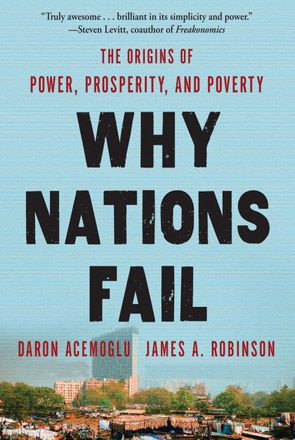It’s easy to look at the world and see examples of the split between rich and poor nations. But why does it happen? Why Nations Fail: The Origins of Power, Prosperity, and Poverty by Daron Acemoglu and James A. Robinson attempts to answer that age-old question.
 Some theories of poverty focus solely on the economics of the situation. These theories say that if only the marketplace or economic opportunities were different, a country could move out of poverty. This book takes a new and insightful approach that moves away from the overly idealistic, economics-only paradigm. While economics are important, the politics of the nation are equally important.
Some theories of poverty focus solely on the economics of the situation. These theories say that if only the marketplace or economic opportunities were different, a country could move out of poverty. This book takes a new and insightful approach that moves away from the overly idealistic, economics-only paradigm. While economics are important, the politics of the nation are equally important.
The authors use many anecdotes and illustrations from throughout history and around the world to make their case. They use a one-dimensional scale of “inclusive” to “extractive” to describe the economic and political landscape in a country. Inclusive institutions are those that share power, allow you to build your reputation, and where you can reap the rewards of the work you’ve done. In extractive institutions, power rests at the top – they prey on people, have no incentive to share or permit growth, and limit innovation. Political institutions that are extractive, even if the economy is inclusive, ultimately lead to poor results for the country as a whole.
One of the biggest takeaways was that a country’s geography, culture, etc. don’t necessarily determine their ultimate fate when it comes to wealth. This is readily observable where we serve in Haiti. Though the island of Hispaniola is shared by both the Dominican Republic and Haiti (same geography, resources, etc.), Haiti is far worse than its neighbor. The extractive political and economic institutions in Haiti compounded over hundreds of years have led to a state of utter poverty and hopelessness. Political change must occur before the economic condition of the country will change for the better. Let’s keep praying that the younger generation of Haitians will want to rise up and lead in an inclusive way in the country that we love and serve.
If you’re looking for some good insights, and aren’t scared off by the length and historical examples, this one is for you.

